Discovering the Enigma of Faltonia Betitia Proba
Imagine a world where poetry intertwines with faith, where ancient verses are reimagined to tell a new story. This is exactly what Faltonia Betitia Proba did in her groundbreaking poem, Cento Vergilianus de laudibus Christi.
The Birth of an Idea
Proba’s journey began with a conversion to Christianity around AD 352-384. As part of the aristocratic class, she had already dabbled in poetry before her religious transformation. But now, she sought to “write holy things,” using Virgil as her canvas.
A Cento of Contrasts
The poem is a cento, meaning it’s made up of verses from Virgil, rearranged and reworked to tell the story of Jesus Christ. This unique format allowed Proba to blend pagan and Christian themes, creating a narrative that was both familiar and new.
A Poetic Challenge
One of the biggest challenges Proba faced was the absence of appropriate terminology in Virgil’s work. To overcome this, she used vague terms like “mother,” “father,” “god,” and “poet.” This creative workaround allowed her to tell a Christian story within the constraints of Virgilian language.
References and Allusions
The poem references Moses as ‘Musaeus,’ an exception that highlights Proba’s ingenuity. The 694 lines are divided into sections, each focusing on different parts of the Bible: creation stories, Old Testament narratives, New Testament accounts, and a final epilogue.
Probing the Poem
The proem and invocation (lines 1-55) set the stage for Proba’s poetic journey. She describes herself as a prophet, calling upon God and the Holy Spirit to aid her in this sacred task. The Old Testament stories are reimagined with Virgilian flair, while the New Testament accounts are presented through Christ’s heroic deeds.
Creation and Fall
The creation narrative is largely based on Virgil’s Georgics, but Proba reorganizes it to align better with contemporary Greco-Roman beliefs. The serpent, for instance, is described using lines that detail Laocoön’s death, while the Great Flood is referenced through the fourth book of the Georgics.
New Testament Portrayals
The New Testament sections recount Jesus’s birth, life, crucifixion, and resurrection. Proba often describes Christ with language befitting a Virgilian hero, emphasizing his beauty and strength. The Sermon on the Mount is introduced by borrowing from the Sibyl of Cumae, and some scholars argue this section contains the first description of hell in Christian poetry.
Symbolism and Interpretation
The characterization of Mary has sparked much debate among scholars. Some see her as a courageous, intelligent materfamilias, while others argue she lacks feminine attributes, drawing attention to Christ’s divinity. Proba’s use of Virgilian language to describe Mary and Jesus is seen as a way to imbue them with heroic virtues.
Historical Context
The poem was written during a time when the respect for Virgil reached its peak in late antiquity. Proba’s purpose was to create a Christian narrative that could compete with pagan literature, using Virgil as a vehicle to convey her message of faith.
A Mixed Reception
De laudibus Christi received mixed responses from scholars and emperors alike. Jerome criticized it harshly, while Emperor Arcadius praised its sacred meaning. The work was also presented to Empress Aelia Eudocia, further cementing its place in early Christian literature.
Modern Scholarship
In recent years, scholars have taken a renewed interest in the poem. While some dispute Proba’s authorship, most classicists agree that she indeed wrote it. The poem is seen as historically and culturally important due to its rarity as an ancient text with a female author.
Conclusion
Faltonia Betitia Proba’s Cento Vergilianus de laudibus Christi stands as a testament to the power of reimagining old stories for new purposes. Through her innovative use of Virgilian verses, she created a unique narrative that bridged pagan and Christian traditions, leaving an indelible mark on early Christian literature.

You want to know more about Cento Vergilianus de laudibus Christi?
This page is based on the article Cento Vergilianus de laudibus Christi published in Wikipedia (retrieved on December 1, 2024) and was automatically summarized using artificial intelligence.







